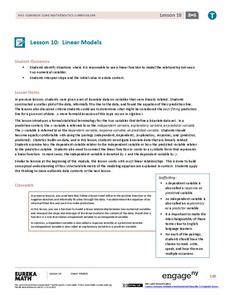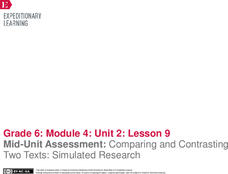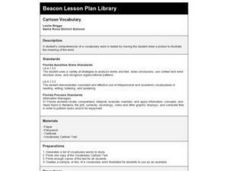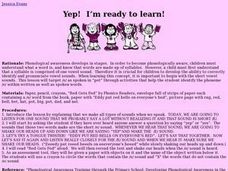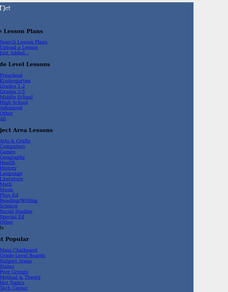EngageNY
Read Expressions in Which Letters Stand for Numbers
Pencil in the resource on writing verbal phrases into your lesson plans. The 15th installment of a 36-part module has scholars write verbal phases for algebraic expressions. They complete a set of problems to solidify this skill.
Curated OER
The Gender of Nouns
A great handout for middle-schoolers learning nouns and their genders, this resource is comprehensive and easy to read. Consider providing some practice opportunities for your learners while you review the information.
EngageNY
Linear Models
Expand your pupils' vocabulary! Learn how to use statistical vocabulary regarding linear models. The lesson teaches scholars the appropriate terminology for bivariate data analysis. To complete the module, individuals use linear...
EngageNY
Mid-Unit Assessment: Comparing and Contrasting Two Texts: Simulated Research
Shoo fly. Scholars read DDT Spray Scares Mosquitoes Away, Study Finds and You Think You Have It Tough? to complete a mid-unit assessment. The learners compare and contrast author presentation and conduct a credibility check on each...
EngageNY
Matrix Notation Encompasses New Transformations!
Class members make a real connection to matrices in the 25th part of a series of 32 by looking at the identity matrix and making the connection to the multiplicative identity in the real numbers. Pupils explore different...
Bowland
Speedy Santa
Santa sure is fast. In the assessment task, learners calculate the number of minutes Santa can spend at each house. This calculation requires the use of given population demographics data.
Curated OER
Fun With Numbers
Students discover the Lakota Sioux words for numbers. They practice writing number sentences. They share them with the class and complete a worksheet.
Curated OER
Introduce Vocabulary: I Hate To Be Sick
Engaged in a read aloud, kids use the story to define new vocabulary words, raising their hands when they hear new words in the story. Additionally, individuals refer to the text to show how the word was used in context....
Curated OER
Please No Posers
How do you reference information correctly? Avoid plagiarism by accurately summarizing a New York Times article with your middle or high schoolers. Young researchers then insert properly attributed quotations and paraphrases into their...
Curated OER
Synthesis of Information
Locating and synthesizing information is an essential part of the research process but can be overwhelming for many young writers. Eliminate some of the stress and confusion, this resource suggests, by separating these steps. To focus...
Curated OER
Cartoon Vocabulary
Third and fourth graders complete a vocabulary log which includes a definition, and a sentence that demonstrates the meaning of the word. Then make an illustration that represents the definition of the word. The trick is that they may...
Curated OER
Life Science: Plant Life Cycles
Practice defining words that have to do with plant life cycles. The list included here is mainly for structural units, but could be used to review their relevance and the process of the life cycle.
Curated OER
Vocabulary 2c - Life Science: From Parents to Young
This life science vocabulary list and definitions will be useful when teaching a parent and offspring unit. Some nice ideas are included in the plan about the word origins, word structure and definition testing methods. There is also a...
Curated OER
Writing a News Story
Students practice using their target language by writing a news article. In this foreign language writing instructional activity, students create a fictional "hero" in their city which they write a fictional news article about in...
Curated OER
Applying Phonetic Principles
Young readers develop their phonetic skills by using a nifty tool called a word pocket. They use the tool to help them organize individual letters that they have at their desks to spell entire words and to construct beginning and ending...
Curated OER
Phonics: Segmenting Words with two or three phonemes
Kindergarteners build phonemic awareness by segmenting words with two or three phonemes. As the teacher says each word, the kids put up a finger for each phoneme they hear. This can also be done with manipulative such as blocks or tally...
Curated OER
Phonemic Awareness: Segmenting
You ever feel like your going in circles? Because this lesson seems very much like others I've seen. First graders put up a finger as they count each phoneme the teacher emphasises as she says a series of words.
Curated OER
Vocabulary Strategy: Call of the Wild
Here is a strategy for groups to contribute to whole class vocabulary development. Teams (based on seating rows) work together to look up dictionary definitions of words from upcoming sections of the book (though previous sections seem...
Curated OER
Vocabulary Development
By utilizing a graphic organizer called a bubble map, young readers work toward developing their vocabulary. After reading a story, a word that has something to do with the story is put in the middle circle. Then, other words that have...
Curated OER
Math Prefixes
Students use a dictionary to gather appropriate information for writing simple definitions. They recognize prefixes that relate to numbers, such as mono-, bi-, and tri-. Pupils use their creative abilities to extrapolate new words to...
Curated OER
Origami Ducks: Geometry, Listening, and Following Directions
Make origami ducks with your class to reinforce geometry concepts and vocabulary; develop fine motor and visual translation skills; and enrich study of Japanese culture, the pond habitat, or migration. Create a whole group "worksheet"...
Curated OER
Yep, I'm Ready to Learn!
Tongue twisters give young learners an easy phrase to refer back to when learning letter sounds. Use the phrase "Eddy put red bells on everyone's bed" to identify the /e/ sound. Then read Red Gets Fed aloud, having learners nod...
Curated OER
Teaching Correct Pronouns
I or me? Are your middle school grammarians struggling with pronoun case? Try this trick. Instruct your learners to look right before or right after the pronoun choice for the words and, or, nor. Have them cover the conjunction and the...
Desert Discoveries
Creating a Garden Journal
Youngsters create science journals which are used to record observations from the school garden. The goal of this activity is to help kids tune into nature by making daily observations on the growth of the plants, and also to take note...


